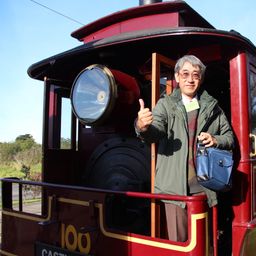
A famous railway researcher in Taiwan. Most interesting in industrial railways especially in sugar, forest, salt, and mine railways. Now is supervisor of Railway Cultural Society Taiwan, Vice President of Asian-Pacific Heritage and Travel Railway Organization (APHTRO), and teacher of Xinying Community University. Publication: 1.Exposing mismanagement of the Taiwan Railway Administration from 1988〜1995, ISBN 9579933502 2.Search for seclusion and beautiful scenery of Taiwan Sugar Railway, ISBN 9867916425
Documents
Sessions auxquelles Nai-Yi Hsu participe
Lundi 29 Août, 2022
Sessions auxquelles Nai-Yi Hsu assiste
Jeudi 1 Septembre, 2022
De sa construction à sa restauration, plongez dans l’histoire et le présent de ce lieu incontournable du patrimoine industriel canadien. Voie maritime centrale au pays, port intérieur majeur, le Lowell canadien (recours à l’énergie hydraulique), berceau de l’industrialisation, Smokey Valley (recours à la vapeur), haut lieu de l’industrie manufacturière, le canal de Lachine est tout cela et plus encore. Car, il est également un lieu historique national où, depuis la réouverture du canal à l...
Many of the remained big scale Industrial heritage in Taiwan were the products of the Japanese colonial period between 1895 and 1945, which spans the first half of the twentieth century. This fifty-year colonial industrialisation is arguably Taiwan’s most influential industrial heritage because it began a rapid process of modernisation that is continuing today. The key to this process is the industrialisation that led to the development of main parts of the island, catalysed new communitie...
Transportation and distribution have served as the secondary component to significant industrial expansion after energy and power transformed modes of production. Expanding production permitted increases in output demanding a means to both bring new materials into industrialized regions and export products to markets. Canals and shipping provided the earliest forms of bulk transportation but were limited by capacity, geography, and envir...
Many of the remained big scale Industrial heritage in Taiwan were the products of the Japanese colonial period between 1895 and 1945, which spans the first half of the twentieth century. This fifty-year colonial industrialisation is arguably Taiwan’s most influential industrial heritage because it began a rapid process of modernisation that is continuing today. The key to this process is the industrialisation that led to the development of main parts of the island, catalysed new communitie...

